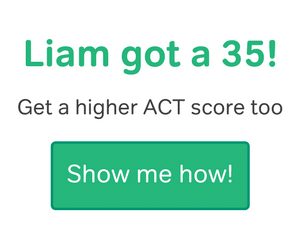Strategy questions on the ACT English test fall under the broader category of “Rhetorical Skills” questions. To give you some context, 35 out of the 75 questions on the English test are Rhetorical Skills questions and about 11 to 15 of these are strategy questions.
Strategy questions, like all rhetorical skills questions, don’t test specific grammar or usage issues; rather, they focus on larger issues about the choices a writer makes in order to communicate ideas clearly and effectively to an audience. This might mean helping the writer improve a sentence or paragraph so that it is more clearly written or more relevant to the topic or audience. The most common type of strategy questions ask test-takers to determine the effect of adding, revising or deleting a phrase or sentence.
Here’s an example of an ACT English strategy question (you can find the related passage here if you want to take a stab at it):
If the writer were to delete the underlined portion, deleting the comma and ending the sentence with a period, the paragraph would primarily lose:
A. an explanation of why so many people used ATMs during the blizzard.
B. descriptive detail about the imagery of the advertising campaign.
C. a restatement of an idea expressed earlier in the paragraph.
D. an explanation of why ATMs became necessary in the late 1970s.
Here’s another example of a common ACT English question stem that asks you whether or not a writer should make an addition or deletion:
At this point, the writer wishes to add the following sentence:
The Liberator was founded in 1831 and was published in Massachusetts.
Should the writer make this addition here?
A. Yes, because it gives the reader specific information regarding The Liberator.
B. Yes, because it helps the reader understand why Garrison could not speak about slavery from personal knowledge.
C. No, because the reader can infer the date The Liberator was founded from the paragraph.
D. No, because it distracts the reader from the focus of the paragraph.
As you can see in the above examples, strategy questions are about the content of a selected section, not the grammar. You should always be answering strategy questions in the context of the whole passage and particularly the paragraph in which it appears.
How to Approach ACT English Strategy Questions
1. Read well above and below the referenced portion.
ACT English questions are often best answered as you go. Read through the
passage until you get to a question, answer it, and keep moving. But with strategy questions, you need to be very careful that you are reading well above and below the highlighted portion. Sometimes, what comes after the section in question will give you the clues you need to answer the question correctly. If a question specifically says “In the context of the passage as a whole,” be extra careful that you are considering the entirety of the passage, and if need be, wait to answer this question until you have read the entire passage.
2. Focus on whether or not an underlined portion is on topic.
Most of the answers to the strategy questions on the ACT will revolve around adding sentences that help clarify a point or help support the development of an important point and deleting those that don’t. If a paragraph is missing an introductory or concluding sentence, the test may be looking for you to add one. If it is missing a connection between ideas or a supporting detail or example that would help a reader understand the content, the test will be looking for you to add that as well. If there is information that is off-topic or unnecessary, the test will be looking for you to get rid of that excess.
3. For “Yes/No” Questions, make eliminations based on the rationale first.
In questions such as the second example above, the rationale is the reason that comes after the “Yes” or “No.” On these questions, ignore the yes or no at first and just focus on eliminating reasons that are not true regardless. So, for example, let’s look at the above question on The Liberator again:
At this point, the writer wishes to add the following sentence:
The Liberator was founded in 1831 and was published in Massachusetts.
Should the writer make this addition here?
A. Yes, because it gives the reader specific information regarding The Liberator.
B. Yes, because it helps the reader understand why Garrison could not speak about slavery from personal knowledge.
C. No, because the reader can infer the date The Liberator was founded from the paragraph.
D. No, because it distracts the reader from the focus of the paragraph.
Without even reading this passage, we can eliminate answer choice B because that sentence says nothing about Garrison or why he could not speak about slavery from personal knowledge, so it cannot possibly be the answer .
Now here is the paragraph in question (the highlighted portion indicates the point referred to in the question):
What made Angelina and Sarah unique and defined within abolitionist circles was neither their oratorical and literary talents nor their energetic commitment to the causes of racial and gender equality. Rather, it was their firsthand experience with the institution of slavery and its negative effect on slaves. ![]() Abolitionists such as William Lloyd Garrison, editor of The Liberator, and Theodore Weld, who Angelina married in 1838, could give stirring speeches about the need to abolish slavery. However, they could not testify to either its impact on African Americans or on their masters from personal knowledge.
Abolitionists such as William Lloyd Garrison, editor of The Liberator, and Theodore Weld, who Angelina married in 1838, could give stirring speeches about the need to abolish slavery. However, they could not testify to either its impact on African Americans or on their masters from personal knowledge.
After reading this paragraph, we can eliminate answer choice C because there is no reference to when The Liberator was founded elsewhere in this paragraph.
So now we are down to A and D and need to apply the principles in point #2 above and decide whether or not the proposed sentence is on topic and helps develop the paragraph. Since this paragraph is focused on two women named Angela and Sarah and their contributions to the abolitionist movement, it’s not crucial to this paragraph that we give so many specifics about The Liberator. It’s simply mentioned in passing, and so our answer is D.
Once you get the hang of them, strategy questions often become quite easy because the ACT repeats the same pattern over and over with these questions, Knowing what to look for is more than half the battle!






Leave a Reply